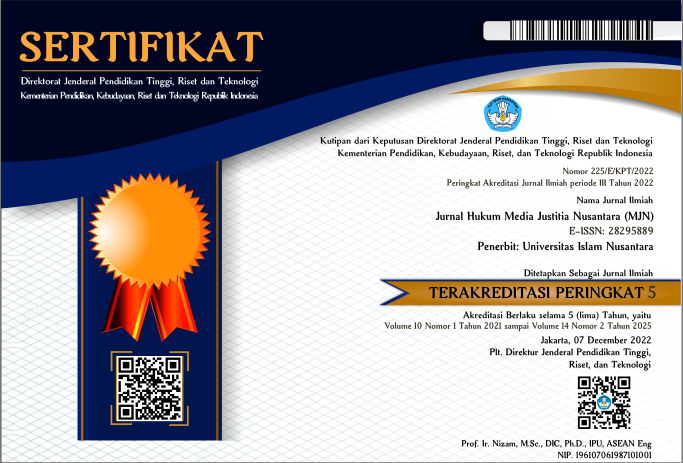On December 14, 2017, the Constitutional Court declared Court Decision Number 46/PUU-XIV/2016, which rejected the petition for judicial review of Article 284, Article 285 and Article 292 of the Criminal Code for all submitted by the Petitioners. Consideration of Decision of the Constitutional Court Number 46/PUU-XIV/2016 which refused the application, one of which is that the Constitutional Court can not necessarily surpass its authority. The expansion of criminal law norms or criminalization is not the domain of the Constitutional Court's authority, but the legislators (DPR and President). Based on such background, this thesis would discuss: How to implement Article 10 paragraph (1) in conjunction with Article 5 paragraph (1) of Law Number 48 Year 2009 on Judicial Power which requires judges to find law related to Decision of the Constitutional Court of the Republic of Indonesia Number 46/PUU-XIV/2016, Dated December 14 2017 ?, and what is the impact after the issuance of Decision of the Constitutional Court of the Republic of Indonesia Number 46/PUU-XIV/2016, Date December 14, 2017? Specifications research was descriptive, with a normative juridical approach, a method in normative legal research used primary sources of secondary data, and it was carried out in one phase, namely the research literature, which was supported by interviews, and used collection techniques data, then after the secondary data including other supporting data,were inventoried, they analyzed by normatives-qualitative. As a result, the writer research found out that: The inconsistency of the five constitutional judges, as if limiting themselves to the concept of judicial restraint, and unwilling to make legal discovery or create a new law in the form of interpretation, because the Constitutional Court is positioned as a negative legislator, therefore Article 10 paragraph (1) jo Article 5 paragraph (1) of Law Number 48 Year 2009 on Judicial Power which requires judges to find law related to Decision of the Constitutional Court of the Republic of Indonesia Number 46/PUU-XIV/2016 has not been applied consistently, and Decision of the Constitutional Court Number 46/ PUU-XIV/2016 on December 14, 2017, declaring rejection of the petition for the amendment of the Criminal Code relating to the regulation of moral crime in Article 284 of the Criminal Code, Article 285 of the Criminal Code and Article 292 of the Criminal Code, for one reason in its consideration. The Constitutional Court could not automatically surpass its authority. The expansion of criminal law norms or criminalization was not the domain of the Constitutional Court's authority, but the legislators (DPR and President) authority, would certainly have the effect of giving loopholes and spatial debates in the discussion of the Draft Law on Penal Law currently being discussed in Parliament (DPR), whether obscene acts, both by and against same sex might be criminally or not in the Unitary State of the Republic of Indonesia, whose population is predominantly Muslim.
17-10-2019
Soeganda, S. (2019). Implementasi Pasal 10 Ayat (1) Jo Pasal 5 Ayat (1) Undang-Undang Nomor 48 Tahun 2009 Tentang Kekuasaan Kehakiman Yang Mewajibkan Hakim Untuk Menemukan Hukum Dikaitkan Dengan Putusan Mahkamah Konstitusi Republik Indonesia Nomor 46/PUU-XIV/2016. Jurnal Hukum Media Justitia Nusantara, 8(2), 52–83. https://doi.org/10.30999/mjn.v8i2.670
Article
Similar Articles
- Priyono Priyono, Eksistensi Pidana Mati Dalam Persfektif KUHP (Studi Kasus Pembunuhan Berencana Disertai Mutilasi Korban Berdasarkan Putusan Mahkamah Agung No. 25 PK/PID/2012) , Jurnal Hukum Media Justitia Nusantara: Vol. 8 No. 1 (2018): Februari 2018
- Hendri Darma Putra, Konsep Pembentukan Badan Peradilan Khusus Penyelesaian Perselisihan Hasil Pemilihan Kepala Daerah (PILKADA) Dihubungkan Dengan Kewenangan Transisi Mahkamah Konstitusi Menurut Undang-Undang Nomor 10 Tahun 2016 Tentang Pemilihan Gubernur, Bupati, dan Walikota , Jurnal Hukum Media Justitia Nusantara: Vol. 8 No. 1 (2018): Februari 2018
- Fontian Munzil, Keberadaan Komisi Yudisial Dalam Rangka Membangun Peradilan yang Bersih dan Berwibawa , Jurnal Hukum Media Justitia Nusantara: Vol. 7 No. 1 (2017): Februari 2017
- Zul Azmi, Disparitas Pemidanaan Pada Perkara Tindak Pidana Korupsi (Studi Kasus Putusan Nomor 125/Pid.Sus. TPK/2018/PN.Bdg. dengan Putusan Perkara Nomor 126/Pid.Sus.-TPK/2018/PN.Bdg.) , Jurnal Hukum Media Justitia Nusantara: Vol. 10 No. 1 (2020): Februari 2020
- Toto Santosa, Putusan Pengadilan Tanpa Perintah Penahanan Berdasarkan KUHAP dikaitkan dengan Pelaksanaan Eksekusi , Jurnal Hukum Media Justitia Nusantara: Vol. 6 No. 1 (2016): Februari 2016
- Deni Handiman, Putusan Pengadilan Atas Dikembalikannya Kepemilikan Kendaraan Kepada Debitur Sebagai Objek Jaminan Fidusia , Jurnal Hukum Media Justitia Nusantara: Vol. 11 No. 2 (2021): September 2021
- Carim B. Merta, Konsep Rehabilitasi Sebagai Implementasi Keadilan Restoratif Tindak Pidana Narkotika , Jurnal Hukum Media Justitia Nusantara: Vol. 11 No. 1 (2021): Februari 2021
- Vany Nur Fakhiryah, Tindak Pidana Memasukkan Keterangan Palsu Ke Dalam Akta Otentik Dalam Perspektif Hukum Pidana Di Indonesia (Putusan Mahkamah Agung Nomor 602 K/PID/2016) , Jurnal Hukum Media Justitia Nusantara: Vol. 10 No. 2 (2020): September 2020
- Dian Irawan, Penegakan Hukum Pelaku Tindak Pidana Narkotika di Lingkungan TNI Berdasarkan UU No. 35 Tahun 2009 Tentang Narkotika Dan UU No. 31 Tahun 1997 Tentang Peradilan Militer , Jurnal Hukum Media Justitia Nusantara: Vol. 7 No. 2 (2017): September 2017
- Tri Mulyani, Penerapan Asas Kebebasan Berkontrak Dalam Perjanjian Jual Beli Dikaitkan Dengan Batalnya Suatu Perjanjian Disebabkan Oleh Wanprestasi , Jurnal Hukum Media Justitia Nusantara: Vol. 6 No. 1 (2016): Februari 2016
You may also start an advanced similarity search for this article.













